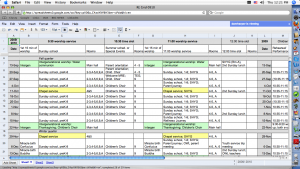Is your church budget strained? Trying to support a building that’s just too darned big? Stephen Leacock has described how the people of Mariposa, in Missinaba County, in Canada, handled the financial problems of their Church of England congregation, and at the same time supported their rector, Dean Drone. Leacock’s story is immediately below; my commentary appears after Leacock:
———
“The fire had broken out late, late at night, and they fought it till the day. The flame of it lit up the town and the bare grey maple trees, and you could see in the light of it the broad sheet of the frozen lake, snow covered still. It kindled such a beacon as it burned that from the other side of the lake the people on the night express from the north could see it twenty miles away. It lit up such a testimony of flame that Mariposa has never seen the like of it before or since. Then when the roof crashed in and the tall steeple tottered and fell, so swift a darkness seemed to come that the grey trees and the frozen lake vanished in a moment as if blotted out of existence.
“When the morning came the great church of Mariposa was nothing but a ragged group of walls with a sodden heap of bricks and blackened wood, still hissing here and there beneath the hose with the sullen anger of a conquered fire. Round the ruins of the fire walked the people of Mariposa next morning, and they pointed out where the wreck of the steeple had fallen, and where the bells of the church lay in a molten heap among the bricks, and they talked of the loss that it was and how many dollars it would take to rebuild the church, and whether it was insured and for how much. And there were at least fourteen people who had seen the fire first, and more than that who had given the first alarm, and ever so many who knew how fires of this sort could be prevented.
“Most noticeable of all you could see the sidesmen and the wardens and Mullins, the chairman of the vestry, talking in little groups about the fire. Later in the day there came from the city the insurance men and the fire appraisers, and they too walked about the ruins, and talked with the wardens and the vestry men. There was such a luxury of excitement in the town that day that it was just as good as a public holiday.
“But the strangest part of it was the unexpected sequel. Continue reading

